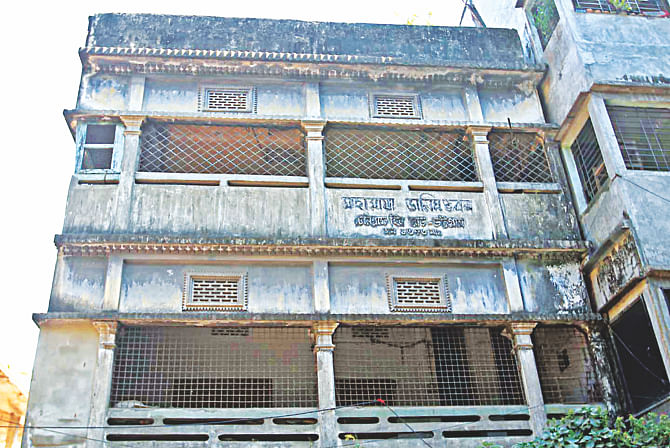Silent witness still there
Silent witness still there
Dalim Hotel was Ctg Al-Badr chief's torture cell

The bloodstains in the three-storey building have long disappeared. Shrieks of torture victims are no longer heard there.
But the Mahamaya Dalim Bhaban at Anderkilla, Chittagong still stands as a reminder of the brutal torture of freedom fighters and pro-liberation people 43 years ago.
Every inch of the building evokes the memory of the heinous atrocities of the Al-Badr and its leader Mir Quasem Ali.
It was an ordinary structure in downtown Chittagong, with a restaurant on its ground floor and a residential hotel on the first. Its owner Chandra Mohan Nath along with his family lived on the top floor.
Just two or three days before the beginning of the Liberation War in 1971, the owner and his family left the area for his village home in Hathazari.
Al-Badr Bahini, which was formed with the leaders and activists of Jamaat's the then student wing Islami Chhatra Sangha (ICS), captured Dalim Hotel and turned it into its main camp. Quasem as the president of Chittagong town ICS became the chief of the “killing squad,” according to prosecution witnesses and documents.
It was a day in late November, 1971. Al-Badr men took freedom fighter Nasiruddin to the hotel. After sometime, Quasem along with other Al-Badr men entered the hotel.
“You are yet to glean any information from him [Nasiruddin]. Beat him up,” Quasem ordered his fellows.
The Al-Badr men started beating up Nasiruddin with sticks, iron rods and electric cables, the freedom fighter told the International Crimes Tribunal-2.
At one stage, Quasem himself grilled the war hero to know about his co-fighters, their shelter and arms. The torture continued.
Among the other Al-Badr victims at the hotel was another freedom fighter, Iskandar Alam Chowdhury.
Narrating his ordeal before the court, Iskandar said Quasem at one stage threatened to kill him and dump his body into the Karnaphuli if he didn't give information about the whereabouts of freedom fighters.
As Iskandar declined to give in, the Al-Badr men inflicted brutal torture on him.
Quasem as the chief of Chittagong Al-Badr, an auxiliary force of Pakistan army, had full control of its headquarters in the city. The name of Dalim Hotel appeared in all the 14 charges brought against the Jamaat leader as the crime scene.
Apart from grilling the captives, Quasem even had the authority to free detainees on the pledge that they would work as his informer to help him detain freedom fighters.
On December 16, 1971, there were over 100 captives of soon-to-be independent Bangladesh, some even for a month, at the Dalim Hotel. They were still unaware that the Liberation War was almost over.
Confined to the Al-Badr camp, some tortured people thought they would die in captivity. A group of freedom fighters rescued them from the hotel early that day.
Among the freed were prosecution witnesses Nasiruddin and Iskandar. Most of the 24 prosecution witnesses were either victims or members of victim families. They testified about the camp and brutal torture there.
THE VERDICT
Yesterday, the ICT-2 in its verdict said, “On cumulative appraisal of evidence as discussed above it is proved that 'system cruelties' practiced routinely at the AB [Al-Badr] camp also included killing of the detained civilians by causing dreadful and brutal torture in confinement there…”
“The evidence presented too provides support to the conclusion that the camp at Dalim Hotel building came to serve as a model for an expanding and centralised torture camp system under AB management,” added the court.
According to the prosecution, Quasem colluded with the Pakistan army, Jamaat, and other anti-liberation forces and formed Al-Badr force; set up several torture camps like that of Dalim Hotel.
The Dostwa Mohammad Panjabee Building and Salma Manzil were the camps set up in Chittagong under Quasem's leadership for torturing and killing pro-liberation people, said witnesses.
The judgment said, “Nature and extent of brutality forming attack directed against civilians, as revealed, indeed demonstrates the grave antagonistic attitude of the AB members and the accused Mir Quasem Ali who had been in steering capacity of them, imbued by his political ideology.”
“Accused Mir Quasem Ali, by his act and conduct had thus achieved a profile of 'Khan Saheb', 'Bangalee Khan' and 'Sarder' [leader or commander] of the AB torture and detention camp at Dalim Hotel and in this way he became an indispensable cog in the 'murdering machinery',” read the verdict.